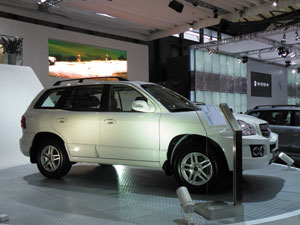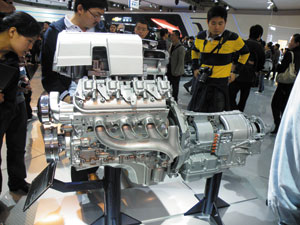Efforts Made in China to Shift Auto-transmission Sector Into Higher Gear
2009/10/08 | By CENSAlong with the fast growing new car sales in China, which became the world's biggest car market in early 2009, the proportion of new cars equipped with automatic transmissions has risen steadily-from about 25% in 2005 to 40% in 2008; while the annual sales volume of automatic-transmission cars has also increased to about 2.3 million last year. Such figures are logical as more drivers in China choose auto transmissions for convenience in worsening traffic, and more women drivers would also choose automatic cars for easier operation. Clearly the demand for automatic transmissions and parts is enormous in China, which are not being met by local suppliers, who can only turn out less than 20,000 units a year now.
With Chinese makers of auto transmissions and parts accessing less than one percent of the market, somewhat embarrassing, such harsh reality also provides impetus for them to try to expand market share in China, where ample room exists for growth.

Definitely auto transmission is one type of automotive mechanism that calls for expert know-how and sophisticated manufacturing capacity; so foreign companies, especially automakers and international first-tier parts suppliers, have been exploiting such advantage to dominate the automatic-transmission market in China, where local makers simply lack the wherewithal to turn out such systems independently. With proprietary know-how related to auto transmission, the foreign makers also command major market shares in China, while most have set up joint-ventures or 100%-ownd operations as the Shanghai General Motors Co., Ltd., Honda Motor Co., JATCO Ltd. etc.
Examples of the foreign joint-ventures and fully-owned plants include Honda Motor's automatic-transmission manufacturing subsidiary set up in Nanhai, Guangdong Province with annual capacity of 240,000 units, which are mainly supplied to Guangqi Honda Automobile Co. and Dongfeng Honda Engine Co., Ltd. JATCO established the JATCO (Guangzhou) Automatic Transmission Ltd. in Huadu, Guangdong Province with annual capacity of 144,000 units for installation on passenger cars produced by Dongfeng Nissan Passenger Vehicle Co. in the same city. Foreign joint-ventures include ZF Transmission Shanghai Co., Ltd., which is 51% owned by ZF of Germany; and Tianjin AW Automatic Transmission Co., Ltd., where Aisen AW of Japan holds an 80% stake.
These foreign-invested makers of automatic transmissions in China now supply not only their long-term clients-global automakers operating in China-but also local carmakers such as Chery Automobile Co., Ltd., BYD Auto, Shanghai Automotive Industry Corp. (SAIC) etc.
Localizing Production
Knowing it would take years of effort and enormous resources to cultivate independent capabilities to make auto transmissions, local carmakers and parts suppliers in China resort to acquisitions to speed crossing into the sector. In late March this year, Chinese carmaker Geely Automobile Holdings announced its acquisition of Australian automatic transmission supplier Drivetrain Systems International Pty Ltd. (DSI) for about US$40.2 million. Geely has right away restarted automatic transmission production at DSI's plant in Australia, continuing to supply the products to automakers as Ford, SsangYong, Chrysler etc.
The acquisition enables Geely to install DSI's automatic transmissions on increasingly more of its cars; but more importantly the Chinese carmaker, able to transfer technology as a benefit of foreign acquisitions, plans to gradually localize production of automatic transmissions, and supply such products to other automakers in China. Industry sources say that Geely is expected to maintain its lead in the automatic-transmission sector in China for some time among local counterparts.
Another Chinese company with homegrown automatic-transmission development and production capability is Chery, a major independent automaker and one of the nation's largest car exporters. Chery has successfully developed an automated manual transmission (AMT) that is installed on its QQ-series subcompact cars; while carmaker China South Motor has begun small-volume installation of AMTs developed by one of its subsidiaries.
In addition to the above-mentioned efforts by Chinese automakers trying to raise local-content by engaging in automatic-transmission development and manufacturing, some independent technology research institutes in China are also aggressively developing the key powertrain system. Such trends show automatic transmissions, despite having high technical thresholds, have become a major market focus in China's automotive industry.

Aiming to help the local automotive industry develop a vital part of the auto drivetrain, the Chinese government has been taking concrete action by injecting more resources towards such goal.
In May 2008 and with negotiation, mediation undertaken by the National Development and Reform Commission, more than 10 private enterprises in China jointly signed an agreement with the foreign partner BorgWarner Inc., an international leader in highly engineered components and systems for powertrain applications in engines, automatic transmissions etc., to set up a technical development institute.
This technical institute engages in R&D, offers technical support and production of homegrown dual-clutch transmissions (DCTs) for local, independent automakers (companies without technical partnerships with foreign automakers).
Though the road ahead remains long to build homegrown automatic transmissions in China, industry experts say, the world-leading new car market and foreseeable future growth lay a solid foundation to turn the efforts into reality.




